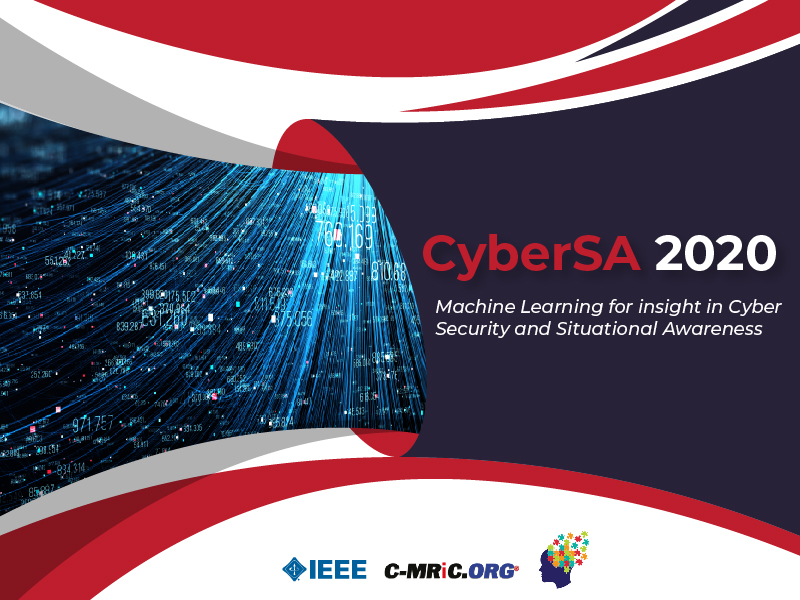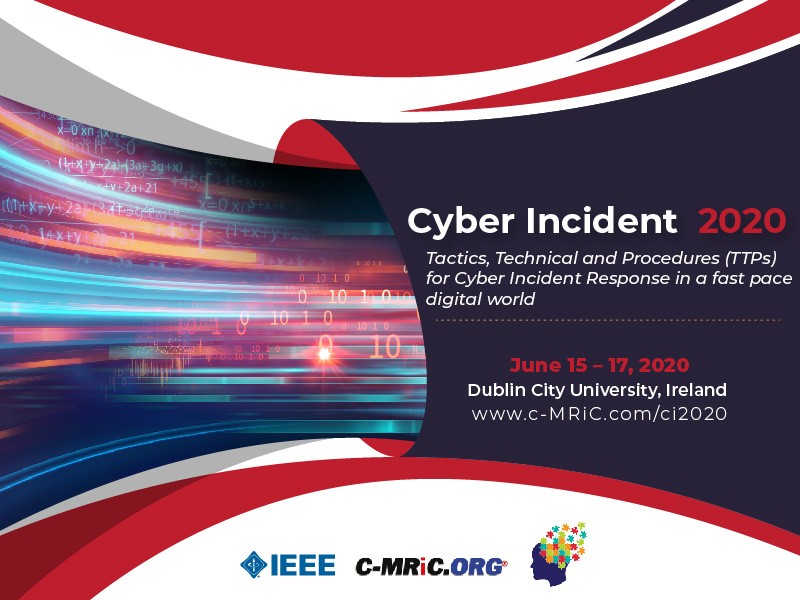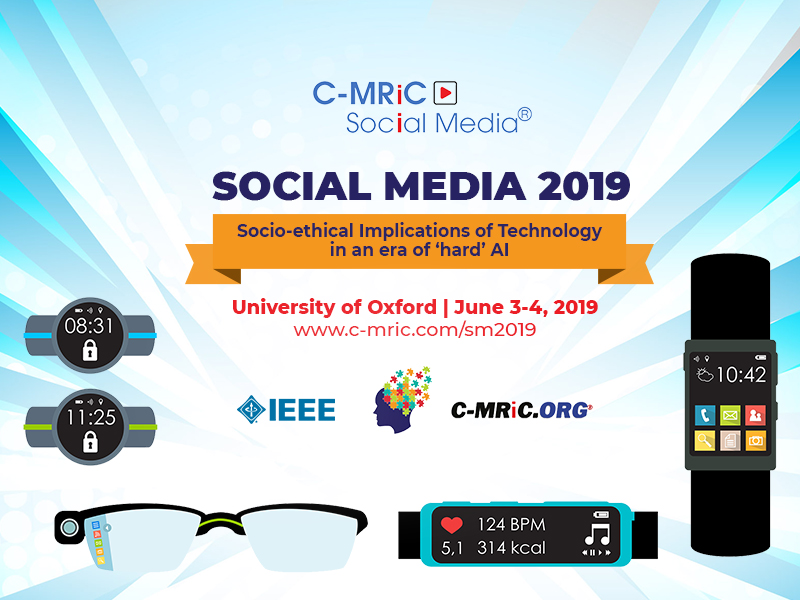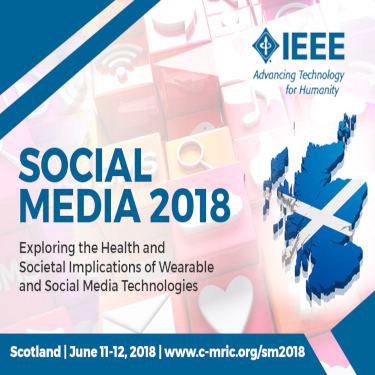
Theme: Advancing Social Media Innovation and Convergence in a Digital Economy.
Conference will be held online / virtual due to COVID19
Download Conference Programme
Download Conference Timetable
June 15 – 19, 2020
Call for Papers
IEEE is the Technical Co-Sponsor (TCS) of the International Conference on Social Media, Wearable and Web Analytics (Social Media 2020), an international refereed conference dedicated to the advancement of social media, security of social media and consequential impacts and risks due to compromise or security breaches. It covers economic importance of social media, the emergence of wearable, wearable for fitness, e-health and life style improvements, and the use of web analytics for social media enhancements, business intelligence and business empowerment.
With the wave of phishing attacks against celebrities, high profile government officials, and nationals on social media, this conference is timely. Most importantly, we seek recommendations, solutions and advice on ways, methods and techniques for protecting our digital society.
The aim of the Social Media 2020 is to encourage participation and promotion of collaborative scientific, industrial and academic inter-workings among individual researchers, practitioners, members of existing associations, academia, standardisation bodies, and including government departments and agencies. The purpose is to build bridges between academia and industry, and to encourage interplay of different cultures.
Social Media 2020 invites researchers and industry practitioners to submit papers that encompass principles, analysis, design, methods and applications. All submitted papers are independently peer-reviewed. The conference is open to the public, so you can attend the event without presenting a paper. Registration for both authors and attendees (without presenting a paper) opens in March 2020. You are welcome!
The conference proceedings will be submitted for consideration for publishing and listing on the following bibliographic indexes:
- IEEE Computer Society Digital Library
- IEEE Xplore Digital Library
- DBLP Computer Science, and
- Others – e.g. Scopus, CiteSeerX, Computer Science Index, EI Compendex, Academic Search Complete, CiteULike, Google Scholar & Microsoft Academic Search.
The organisers will accept registration of up to 5 IEEE UK&I Student and YP Members at 75% discounted rate, and will offer up to 20% registration discounts for all IEEE, BCS, IET & IISP members.
Details
Social Media 2020 is co-located with other conferences as part of Cyber Science 2020.
- Posters will be presented during the conference.
- Industry track is available for discussing and publishing pilot and proof of concepts.
- Work in Progress track is available for preliminary work.
- Research Ideas track is available for ideas in early stages assessment.
- PhD Seminar track is available for discussing and publishing early PhD thesis research.
Paper Submission
The deadline for all paper submissions, that is, both full papers and extended abstracts for Poster, WIP, PoC, Research Idea and PhD Seminar presentations was 26th January 2020, but now extended to 6th March 2020.
All Industry track, Work in Progress track, Research Ideas track and PhD Seminar track will be published in the conference proceedings. Interested participants, please submit your proposal using the online submission system hosted by Easychair Conference Portal.
Full paper submission should be via Easychair Conference Portal.
Online Submission
The online submission process is now open!
Please prepare your paper according to the formatting guidelines (Word document/PDF template/LaTeX). Use the IEEE A4 paper type. Please note that it’ll be IEEE e-copyright, which must be completed for all accepted papers. We’ll send authors’ of accepted papers instruction on how to complete an IEEE e-copyright form.
Authors must use the online submission systems hosted by EasyChair Conference System to submit their papers. Please use/download the IEEE A4 paper template, and specify which conference your submission is to. If you don’t have an EasyChair account you will need to create one and then login in order to submit your papers. Please read the Submission Instructions before submitting your work in the system.
Submission Instructions
Both long (8 pages max., roughly 8,000 words) and short (4 pages max., roughly 4,000 words) paper submissions should be written in English and be submitted electronically via the EasyChair conference portal. Submission file formats are PDF and Microsoft Word using the IEEE A4 Paper template that can be found at the corresponding C-MRiC website. Authors wishing to present a Poster, Industry Proof of Concept (PoC), Work in Progress (WIP), Research Ideas, or PhD Seminar may submit a 2‐page extended abstract using the online submission systems hosted by EasyChair Conference System, which, if accepted, will appear in the conference proceedings.
BOOK NOW
Topics of Interest
- Advances in Social Media
- Social Media theoretical underpinnings
- Security in Social Media
- Trust and privacy in Social Media
- Social Medial Big Data Analysis
- Organisational Knowledge Management
- Branding and E-Marketing
- Realtime Communications and Instant Messaging
- Social Network Analysis
- Social Media Technologies
- Convergence
- Advances in Wearable
- Wearable in e-Health
- Wearable in Fitness
- Wearable and Bring You Own Devices (BYOD) in the Enterprise
- Security, Trust and Privacy in Wearable
- Wearable Technologies
- Economic Importance of Wearable
- Life Style Impacts
- Interaction, Interface and Customisation
- Design Requirements and Requirements Analysis
- Aesthetics and Design
- Monitoring
- Advances in Web Analytics
- Web Analytics for Law Enforcement and Security Monitoring
- Legal Issues of Web Analytics
- Law, Legislation and Compliance
- Security, Trust, Privacy
- Web Analytics for Business Intelligence
- Web Analytics and Web Surveillance
- Web Analytics and Geolocation
- Content-Aware analytics
- Digital Content
- Customisation, e-Marketing and Tailoring
- Customer-centric Analysis
- Social Network Analysis
- Web Analytics Technologies & Tools
- Principles of Health Informatics
- Data, Information and Knowledge
- Improvement and Performance Assessment
- Research Methods in Healthcare
- Clinical Informatics
- Integrated Data Repository
- Health care Data Security
- Information Systems in Health Care
- Privacy and Security of Health Data
- Cyber Health
- Analysis & Presentation of Healthcare Data for Decision Making
- Healthcare Management
- Management of Healthcare Organisations
- Principle and applications of OSNs
- Techniques for analysis of OSNs
- Open Source Threat Intelligences
- Social Network Analysis
- Social Network Platforms
- Evolution and Emerging OSNs
- Social-ethical implications of OSNs
- Detection of False News and Memes
- Cyber Intelligence
- Business Intelligence
- Business Analytics & Intelligence
- Situational Awareness
- Principles, Theory & Research
- Endpoint Monitoring, User and Entity Analysis
- Application and Session Monitoring
- Risk Assessment and Management
- Data Mining and Machine Learning in Social Systems
- Digital Contents
- Digital Economics
- Blockchain Systems
- Social and Digital Inclusion
- Digital Trust and Reputation
- Measurement and analysis of social and crowdsourcing systems
- Learning, Communities & Skills development
- Cultural Impacts
- Research into social communities and culture
- Social and Digital Inclusion
- Digital Trust and Reputation
- Bridging Geographical and Location Gaps
Speakers
Important Dates
- Industry (Proof of Concept / Pilot) Submission –
January 26, 2020extended to March 6, 2020 - Extended Abstract (Work in Progress) –
January 26, 2020extended to March 6, 2020 - PhD Seminar Submissions –
January 26, 2020extended to March 6, 2020 - Research Ideas –
January 26, 2020extended to March 6, 2020 - Poster/Demo Submissions –
January 26, 2020extended to March 6, 2020 - Special Track Submissions –
January 26, 2020extended to March 6, 2020 - Workshops and Tutorials Submission –
January 26, 2020extended to March 6, 2020 - Full Paper Submissions –
January 26, 2020extended to March 6, 2020 - Notification of Full Paper/Abstract / Special Track Acceptance/Rejection –
March 26, 2020extended to April 17, 2020 - Camera Ready Paper Due –
April 14, 2020extended to May 8, 2020 - Participants Registration – March 26 – May 31, 2020
- Conference Date – June 15 – 19, 2020
Location
Moved to Online / Virtual
Programme Committee
- Cyril Onwubiko – Centre for Multidisciplinary Research, Innovation and Collaboration, UK
- Frank Wang – Computer Society, IEEE United Kingdom and Ireland
- Theo Lynn – Dublin City University, Dublin, Ireland
- Nick Savage – University of Portsmouth, UK
- Eckhard Pfluegel – Faculty of Science, Engineering and Computing, Kingston University, UK
- Theo Lynn – Dublin City University, Dublin, Ireland
- Pierangelo Rosati – Dublin City University, Dublin, Ireland
- Grace Kenny – Dublin City University, Dublin, Ireland
- Patricia Endo – Universidade de Pernambuco, Brazil
- Uri Blumenthal – MIT Lincoln Laboratory, MIT, USA
- Xavier Bellekens – University of Strathclyde, Scotland, UK
- Patricia Endo – Dublin City University, Dublin, Ireland
- Arnau Erola – Cyber Security Centre, Department of Computer Science, University of Oxford, Oxford, UK
- Xavier Bellekens – University of Strathclyde, Scotland, UK
- Cyril Onwubiko – Centre for Multidisciplinary Research, Innovation and Collaboration, UK
- Uwe Glässer – School of Computing Science, Simon Fraser University, Canada
- Jens Myrup Pedersen – University of Aalborg, Denmark
- Michal Chorasm – Telecommunications and Computer Science, University of Science and Technology (UTP), Bydgoszcz, Poland
- Marios Anagnostopoulos – University of the Aegean, Greece
- Ciza Thomas – College of Engineering, India
- Varun Dutt – Indian Institute of Technology Mandi, India
- Lynsay Shepherd – Abertay University, Dundee, Scotland, UK
- Florian Skopik – Cyber Security Research, AIT Austrian Institute of Technology, Austria
- Palvi Aggarwal – Carnegie Mellon University (CMU), USA
- Sean Mckeown – Edinburgh Napier University, Scotland, UK
- Arghir-Nicolae Moldovan – National College of Ireland (NCIRL), Ireland
- Domhnall Carlin – Queen’s University (QUB), Belfast, Northern Ireland, UK
- Karen Renaud – Abertay University, Scotland, UK
- Maria Bada – University of Cambridge, UK
- Kim Tam – Plymouth University, UK
- Felix Heine – Hannover University of Applied Sciences, Germany
- Ruth Ikwu – Cardiff University, Wales, UK
- Kumar Bandeli – Data Science, Walmart Inc., USA
- Avishek Nag – UCD Ireland
- Charles Clarke – Kingston University, London, UK
- Varun Dutt – Indian Institute of Technology (IIT) Mandi, India
- Nicholas Savage – Portsmouth University, UK
- Egon Kidmose – Aalborg University, Denmark
- Ivan Silva – Instituto Metrópole Digital (IMD), Federal University of Rio Grande do Norte (UFRN), Brazil
- Frank Wang – Kent University, UK
- Vanderson de Souza Sampaio – Fundação de Medicina Tropical Dr. Heitor Vieira Dourado, Brazil
- Kumar Bandeli – Data Science, Walmart Inc., USA
- Ankit Pradhan, Punith. R, Kamalakanta Sethi and Padmalochan BeraSmart Grid Data Security using Practical CP-ABE with Obfuscated Policy and Outsourcing Decryption
- Julian J. Teule, Marius F. Hensel, Victor Büttner, Jonathan V. Sørensen, Magnus Melgaard and Rasmus L. OlsenExamining the Cyber Security of a Real World Access Control Implementation
- Peter Maynard and Kieran MclaughlinBig Fish, Little Fish, Critical Infrastructure: An Analysis of Phineas Fisher and the `Hacktivist’ Threat to Critical Infrastructure
- Nicolas Pelissero, Pedro Merino Laso and John PuentesNaval cyber-physical anomaly propagation analysis based on a quality assessed graph
- Clet Boudehenn, Jean-Christophe Cexus and Abdel BoudraA Data Extraction Method for Anomaly Detection in Naval Systems
- Suleiman Yerima and Mohammed AlzaylaeeMobile Botnet Detection: A Deep Learning Approach Using Convolutional Neural Networks
- Konstantin Pozdniakov, Eduardo Alonso, Vladimir Stankovic, Kimberly Tam and Kevin JonesSmart Security Audit: Reinforcement Learning with a Deep Neural Network Approximator
- Cyril OnwubikoFocusing on the Recovery Aspects of Cyber Resilience
- Blaise Cossi Avoussoukpo, Chunxiang Xu, Marius Tchenagnon and Eltayieb NabeilTowards an Aggregate Signature-based Authentication for Opportunistic Networks
- Fiona Carroll, Phil Legg and Bastian BønkelThe Visual Design of Network Data to Enhance the Cyber Security Awareness of the Everyday Internet User
- Jordan Richard Schoenherr and Robert ThomsonBeyond the Prisoner’s Dilemma: the Social Dilemmas of Cybersecurity
- Jason R. C. Nurse, Louise Axon, Arnau Erola, Ioannis Agrafiotis, Michael Goldsmith and Sadie CreesThe Data that Drives Cyber Insurance: A Study into the Underwriting and Claims Processes
- Ulrik Franke and Joakim WernbergA survey of cyber security in the Swedish manufacturing industry
- Tal PavelCyber Insurance Market in Israel – What is the Official Policy?
- Farhad Foroughi, Hossein Hadipour and Ahmad M. ShafieeHigh-Performance Monitoring Sensors for Home Computer Users Security Profiling
- Ankit Pradhan, Venu Madhav Yatam and Padmalochan BeraSelf-Attention for Cyberbullying Detection
- Ahmed Abdulrahman Alghamdi and Giles RegerPattern Extraction for Behaviours of Multi-Stage Threats via Unsupervised Learning
- Tania Wallis and Christopher JohnsonImplementing the NIS Directive, driving cybersecurity improvements for Essential Services
- Abdulmajeed Abdullah Alahmari and Bob DuncanCybersecurity Risk Management in Small and Medium-Sized Enterprises: A Systematic Review of Recent Evidence
- Jasmina Maric5Es -> 4Cs 21st-century skills learning
- Katorah Williams, Mollie Rose Ducoste and Aunshul RegeEducating multidisciplinary undergraduates on security and privacy
- Felix Larbi Aryeh, Boniface Kayode Alese and Olayemi OlasehindeGraphical analysis of captured network packets for detection of suspicious network nodes
- Urja Pawar, Donna O’Shea, Susan Rea and Ruairi O’ReillyExplainable AI in Smart Healthcare
- Ahmet Aris and Sema F. OktugAnalysis of the RPL Version Number Attack with Multiple Attackers
- Daniel Krohmer and Hans D. SchottenDecentralized Identifier Distribution for Moving Target Defense and Beyond
- Lukas Gressl, Alexander Rech, Christian Steger, Andreas Sinnhofer and Ralph WeissneggerA Design Exploration Framework for Secure IoT-Systems
- Maicon Herverton Lino Ferreira da Silva Barros, Morgana Thalita da Silva Leite, Vanderson Sampaio, Theo Lynn and Patricia Takako EndoApplication and analysis of record linkage techniques to integrate Brazilian health databases
- Lale Madahali and Margeret HallApplication of the Benford’s law to Social bots and Information Operations activities
Related Conferences:

Cyber SA 2020
IEEE is the Technical Co-Sponsor (TCS) of the International Conference on Cyber Situational Awareness, Data Analytics and Assessment (Cyber SA 2020).
View More
Cyber Security 2020
IEEE is the Technical Co-Sponsor (TCS) of the International Conference on Cyber Security and Protection of Digital Services (Cyber Security 2020).
View More
Cyber Incident 2020
IEEE is the Technical Co-Sponsor (TCS) of the International Conference on Cyber Incident Response, Coordination, Containment & Control (Cyber Incident 2020).
View More










